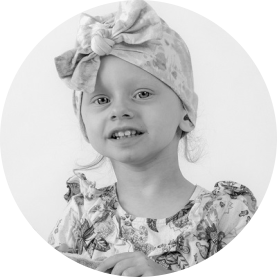- Neuroblastoma
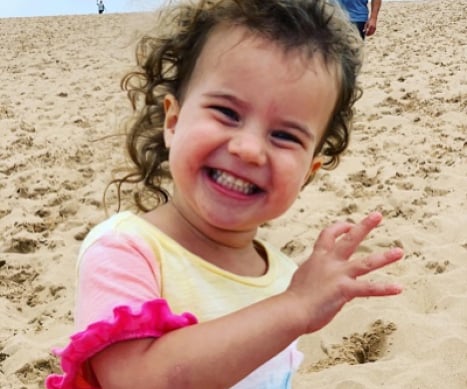

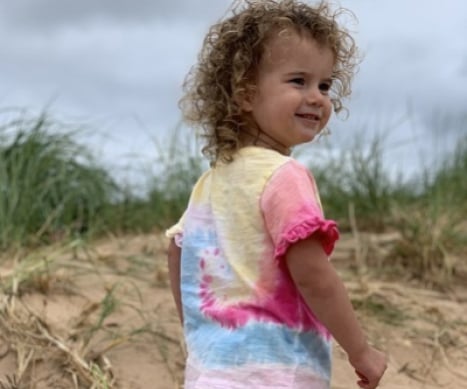
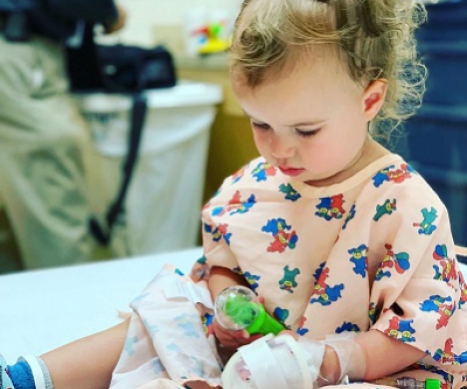
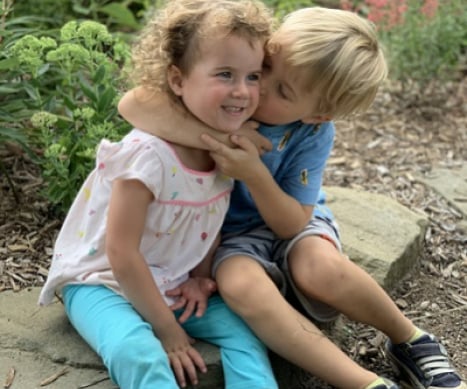
Click the images to see them larger above!
Learn more about
Neuroblastoma
Get the facts about Neuroblastoma and how our research projects are making a difference.
Learn More »Charlotte is a spirited, cheerful, fearless and strong-willed 3-year-old. She loves dolls and babies, animals, riding her scooter, reading books, coloring and being outside. Charlotte looks up to her big brother, Finn, and likes to imitate and play with him. She loves to do things independently but also loves to snuggle and be held. When she was born, the nurse said that she was "tiny but mighty," and boy has that ever proven to be true!
Charlotte was 22 months old when her whole life was flipped upside down. She had hit all of her developmental milestones at age appropriate times, but on July 16, 2019, she began exhibiting strange behaviors. When her dad took her to push the button on the coffee maker, as he would often have her do in the mornings, she suddenly lacked the coordination to do so. She would fall when walking around and also had some erratic eye movements. Concerned, her parents took her to the emergency department at Mott Children's Hospital in Ann Arbor, Michigan. Over the next two days, Charlotte endured blood work, a full body MRI, a lumbar puncture and an electroencephalogram (EEG) to assess the sudden onset of her symptoms. The results were all negative, and she left the ED with a diagnosis of acute viral cerebellar ataxia.
Doctors warned Charlotte’s parents that her symptoms would most likely worsen before she began to recover. Soon after returning home Charlotte could no longer walk without falling and could barely sit independently. During a follow-up appointment, doctors discovered Charlotte had neuroblastoma located near her tailbone, an area of her body that the initial MRI had not detected.
Charlotte had surgery on October 4, 2019 at Mott Children's Hospital to excise the tumor. It was successful. Charlotte worked hard the next couple months to improve her verbal and physical abilities as well as overcome her behavioral challenges.
Two days before Christmas, she received some devastating news from her pediatric neurologist: Charlotte had an extremely rare condition called Opsoclonus-Myoclonus Syndrome (OMS). Even though her tumor was removed, it was responsible for causing her OMS symptoms. After some research, her family decided to travel to Boston's Children Hospital to seek guidance from Dr. Mark Gorman, a known expert with treating this rare syndrome. He advised the doctors at University of Michigan, and Charlotte began an aggressive treatment for OMS at Mott, including Rituximab infusions (a chemo medication that was given in four doses), IVIG infusions and the Dexamethasone steroid. For the next seven months, Charlotte continued to get monthly infusions of IVIG as well as steroids.
They have started to slowly wean Charlotte off of steroids, and she should be completely off of them by December 2020. She will have to continue with monthly IVIG infusions for at least two years and will most likely get another dose of Rituximab once her B cells start to return. Charlotte will also continue to have follow-up MRIs every three months. She and her parents routinely meet with her oncologists and neurologists at UM and Boston Children's. Charlotte’s experience has changed Mott hospital’s protocol for future patients who are admitted with similar symptoms.
Charlotte is her family’s hero because of how brave and resilient she is. Her joyful and silly personality is infectious, and her courage is what helped her family get through an incredibly hard situation.
“We are beyond thankful that our little girl is back to her spunky, fun-loving self!” said Nicole, Charlotte’s mom. “She has made tremendous progress and we have no doubt she will continue to learn and grow.” Her family will be there to support Charlotte as she reaches her potential, both physically and emotionally. They want her to have access to all the opportunities every child should be able to have growing up.
The advice Nicole wants to give to others who may be facing a childhood cancer diagnosis is to take advantage of any support that's offered to help you out during this difficult time. It is okay to lean on your family and friends. “Be an advocate for your child,” she said. “Don't be afraid to question the doctors, the tests, etc. Have faith in your child... kids are strong and resilient.”
Nicole was first connected to Alex’s Lemonade Stand Foundation through Charlotte’s uncle, Adam Nolan, who is a long-time supporter of the Foundation. She is so grateful for the existence of an organization that not only connects families, but allows everyone to find hope and strength from others' stories.
"Well, you know, little people can do big things. Not everybody knows that." – Finn, age 5 (Charlotte's brother)
Information provided by Nicole Jenkins, Charlotte’s mother
Updated October 2020
Donate in Honor of Charlotte Today!
Your donation helps to fund critically-needed research to find better treatments and cures for children with cancer.


